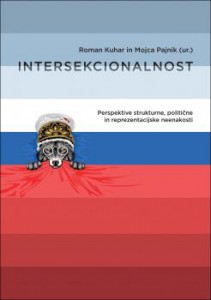
Intersectionality: Perspectives on Structural, Political and Representational Inequality
This scholarly monograph, edited by Roman Kuhar and Mojca Pajnik (Scientific publishing house UL FF), examines the presence, but in fact reveals the absence, of intersectional perspectives in policymaking as well as related media discourses in Slovenia. The book consists of six thematic chapters, which are accompanied by a conceptual and methodological introduction and a transcript of a debate with Mieke Verloo, one of the most prominent international researchers on intersectional inequalities. The book’s focus is on the concept of intersectionality, and it examines it by analysing policies and public discourses in Slovenia over the last twenty years, i.e. during a time of rising exclusion, declining democracy and multiplying crises. The authors are interested in the extent to which the policies developed in Slovenia in this period have recognised complex inequalities, in how much attention has been paid to this topic by the media, and in how intersectionality has manifested itself at the “crossroads of discrimination” in everyday life. The monograph presents selected findings from the basic research project “Citizenship and discrimination: intersectional approach to research of social exclusion”. Discrimination and social exclusion are analysed through the intersectional perspectives of gender, ethnicity, religion and sexual orientation at the level of structural, political and representational intersectionality.
